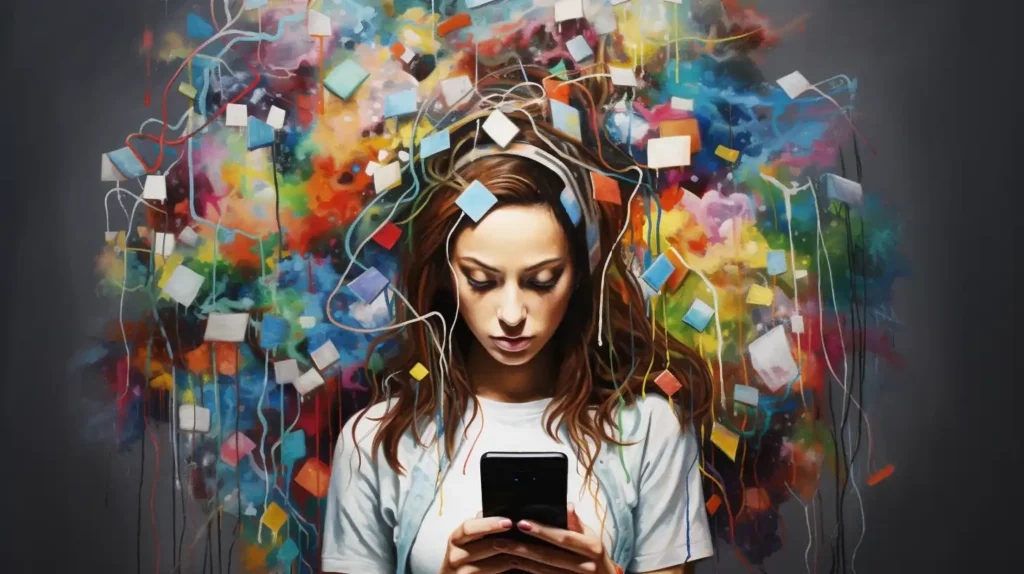If you’ve been feeling down lately, constantly comparing yourself to others, or experiencing anxiety, it might be time to consider taking a break from social media. Deleting social media for mental health reasons has become a popular trend in recent years, and for good reason. Research has shown that social media can have negative effects on mental health, including increased feelings of depression, anxiety, and even insomnia.

Social media platforms have been designed to keep you engaged and scrolling for as long as possible, but this can come at a cost to your mental health. The constant bombardment of curated content and highlight reels from others’ lives can lead to feelings of inadequacy and low self-esteem. Additionally, the pressure to maintain a certain image or persona on social media can be exhausting and stressful.
Deleting social media for mental health reasons can be a wise decision when it begins to affect your well-being negatively. Taking a break from social media can help you reconnect with yourself, your thoughts, and your feelings. It can also provide an opportunity to focus on meaningful relationships and activities that bring you joy.
Understanding the Impact of Social Media on Mental Health

Social media has become an integral part of modern life, with billions of users worldwide. While social media can have positive effects on mental health, such as increased social connection and support, it can also have negative effects. Understanding the impact of social media on mental health is crucial to making informed decisions about its use.
The Psychology of Social Media Engagement
Social media platforms are designed to be engaging, with features such as likes, comments, and notifications that trigger dopamine release in the brain. This can create a cycle of reward-seeking behavior, leading to excessive social media use and negative impacts on mental health.
Social Media’s Effect on Attention Span and Body Image
Social media can also negatively impact attention span and body image. The constant stream of information and notifications can make it difficult to focus on tasks, leading to decreased productivity and increased stress. Additionally, social media can promote unrealistic beauty standards, leading to body dissatisfaction and negative self-image.
The Link Between Social Media and Depression Anxiety
Research has shown a link between social media use and depression and anxiety. Excessive social media use can lead to feelings of social isolation, FOMO (fear of missing out), and decreased self-esteem. Social media can also expose users to cyberbullying and online harassment, leading to increased stress and anxiety.
Overall, while social media can have positive effects on mental health, it is important to use it mindfully and in moderation. Understanding the potential negative impacts of social media on attention span, body image, and mental health can help you make informed decisions about your social media use.
The Benefits of Taking a Break from Social Media

If you’re feeling overwhelmed and stressed out by social media, it might be time to take a break. Here are some of the benefits you can expect when you step away from the screen and take a break from social media.
Improvements in Real-World Relationships
One of the most significant benefits of taking a break from social media is that it can help you feel more connected to the real world. When you’re not constantly checking your phone for notifications, you can focus on the people around you. You might find that you have more meaningful conversations with your friends and family, and that you feel more present in your interactions with others.
Enhanced Focus and Productivity
Social media can be a major distraction, and taking a break from it can help you stay focused and productive. Without the constant stream of notifications and updates, you can concentrate on the task at hand and get more done in less time.
Reduction in Social Anxiety and Stress
Social media can be a source of stress and anxiety for many people. From worrying about how many likes your posts get to feeling like you’re missing out on events and experiences, social media can take a toll on your mental health. Taking a break from social media can help you feel more relaxed and less anxious, and can even improve your overall mood.
In conclusion, taking a break from social media can have many health benefits, including improvements in real-world relationships, enhanced focus and productivity, and a reduction in social anxiety and stress. If you’re feeling overwhelmed by social media, consider taking a break and see how it can benefit your mental health.
How to Delete Your Social Media Accounts

If you’ve decided to delete your social media accounts for mental health reasons, it’s important to know how to do it properly. Here’s a step-by-step guide for deleting your Facebook, Instagram, and Twitter accounts, as well as some things to consider before taking the plunge.
Step-by-Step Guide for Facebook, Instagram, and Twitter
- Log in to your Facebook account and click on the down arrow in the top right corner.
- Select “Settings & Privacy” and then “Settings.”
- Click on “Your Facebook Information” and then “Deactivation and Deletion.”
- Choose “Delete Account” and then click on “Continue to Account Deletion.”
- Follow the prompts to confirm your decision and delete your account.
- Log in to your Instagram account on a web browser.
- Go to the “Delete Your Account” page.
- Choose a reason for deleting your account from the dropdown menu.
- Re-enter your password and click “Permanently delete my account.”
- Log in to your Twitter account on a web browser.
- Click on “More” in the left-hand menu and then select “Settings and Privacy.”
- Scroll down to the bottom of the page and click “Deactivate your account.”
- Follow the prompts to confirm your decision and delete your account.
What to Consider Before Deleting the Apps
Before you delete your social media accounts, there are a few things to consider:
- Make sure you have a backup of any important data, such as photos or messages.
- Consider whether you want to deactivate your account temporarily or delete it permanently.
- Think about how deleting your accounts will affect your social life and connections with others.
- Be prepared for the possibility of experiencing FOMO (fear of missing out) or feeling disconnected from the world.
Deleting your social media accounts can be a big decision, but it can also be a positive step for your mental health. Just make sure you’re doing it for the right reasons and that you’re prepared for the consequences.
Life After Social Media

Reconnecting with the Real World
After deleting social media, you may find yourself with more free time and a greater desire to connect with the real world. You may feel more present in your surroundings and more engaged in your daily activities. You may also find that you have more meaningful conversations with people in person, rather than just exchanging likes and comments online.
To make the most of your newfound free time, consider taking up a new hobby or activity that you’ve always wanted to try. This can be a great way to meet new people and explore new interests. You may also find that you have more time to focus on your existing relationships, whether that means spending more quality time with your partner, children, or friends.
Maintaining Mental Health Post-Social Media
Deleting social media can be a positive step towards improving your mental health, but it’s important to remember that it’s not a cure-all. You may still experience feelings of anxiety, depression, or loneliness, and it’s important to have strategies in place to manage these feelings.
One way to maintain good mental health post-social media is to stay connected with friends and family in other ways, such as through phone calls, text messages, or in-person visits. You may also find it helpful to engage in activities that make you feel good, such as exercise, meditation, or creative pursuits.
Remember that everyone’s journey is different, and it’s okay to take things at your own pace. Be patient with yourself and celebrate the small victories along the way. With time and effort, you can build a fulfilling life that is not dependent on social media.
Frequently Asked Questions

What are the psychological benefits of quitting social media?
Quitting social media can have several psychological benefits. For starters, it can reduce the amount of time you spend comparing yourself to others, which can lead to feelings of inadequacy and low self-esteem. Additionally, it can help you break free from the cycle of seeking validation from likes and comments. Finally, quitting social media can give you more time to focus on your hobbies, relationships, and personal growth.
How does a social media detox impact one’s mental well-being?
A social media detox can have a positive impact on your mental well-being. Research shows that excessive social media use can lead to feelings of anxiety, depression, and loneliness. By taking a break from social media, you can reduce these negative emotions and improve your overall mental health.
What do individuals report about their mental health after leaving social media?
Individuals who have quit social media report feeling less anxious, less depressed, and more connected to the people around them. They also report having more free time to pursue their interests and hobbies.
Are there any negative effects associated with quitting social media?
While quitting social media can have many benefits, there are some potential negative effects. For example, you may feel disconnected from your social circle if you rely on social media to keep in touch with friends and family. Additionally, quitting social media may make it harder to stay informed about current events and news.
How long should a break from social media be to notice improvements in mental health?
The amount of time it takes to notice improvements in mental health can vary from person to person. Some people report feeling better after just a few days away from social media, while others may take weeks or even months to notice a difference. It’s important to remember that everyone’s journey is different, and there is no one-size-fits-all solution.
What have celebrities cited as reasons for stepping away from social media platforms?
Celebrities have cited a variety of reasons for stepping away from social media platforms. Some have cited the negative impact social media can have on mental health, while others have cited concerns about privacy and online harassment. Still, others have simply felt that social media was taking up too much of their time and energy.


